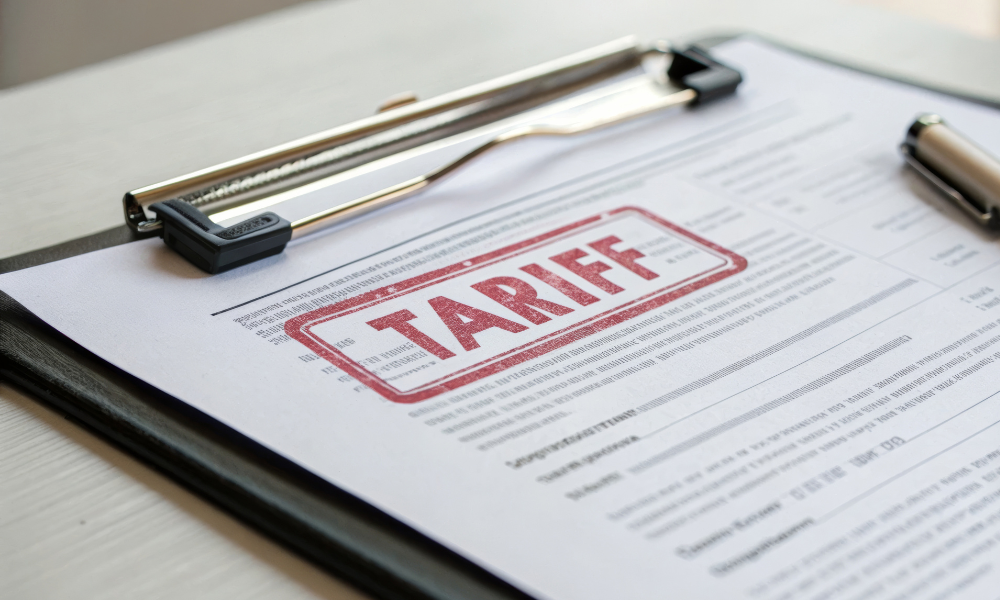

by Abhishek Vishnoi and Prima Wirayani
Financial markets greeted US President Donald Trump’s tariff deal with Indonesia with little fanfare Wednesday, signaling the rate of around 20% that was once viewed as punitive is now seen as workable.
Stocks and other assets were mixed in Asia after Trump announced a 19% tariff for Indonesian goods. Shares in the southeast Asian nation ticked higher on optimism the new levy was at least lower than the 32% originally threatened by the president. Vietnam’s shares have risen since Trump in early July said he reached a trade deal with the nation.
The recent calm is a turnaround from earlier in the year. The market collapse, including havens such as Treasuries, was so severe in April after Trump’s global “Liberation Day” tariffs that he paused them within days.
Now, markets view them more as bargaining ploys used by the president to extract trade concessions. A number of measures of financial-market volatility, such as the ICE BofA MOVE Index of US Treasuries, have touched multi-year lows.
While countries such as India and Vietnam have attempted to negotiate US tariffs of well below 20%, Trump has said he’s eyeing blanket tariffs of 15% to 20% on most trading partners. This suggests the 20% level is no longer perceived as a penalty but rather as a standard in the negotiations.
“Indonesia’s apparent deal with Trump, alongside the UK-US deal and the Vietnam-US deal, point to the US tariffs staying in the 10%-to-20% range,” said Homin Lee, a macro strategist at Lombard Odier in Singapore. There’s some relief in Asia, but investors are largely in a wait-and-see mode as tariffs for the European Union, Mexico and Canada, which together represent half of US imports, are still in the works, he said.
The US-Indonesia agreement — which hasn’t yet been confirmed by Jakarta — would be the first struck with a country targeted by Trump’s tariff letters dispatched last week. The correspondence was seen as attempt to ratchet up pressure on negotiators before the Aug. 1 deadline for the higher duties to come into effect.
“So far, equity markets have reacted calmly as the reduction of uncertainty has been viewed positively,” said Rajeev De Mello, a portfolio manager at Gama Asset Management SA. Still, “20% US tariff levels are a worrying evolution, which would lead to a higher effective US tariff than what was expected a few weeks ago,” he said
Some analysts see the latest agreement as beneficial to wider Asian assets.
The US deal with Indonesia will “help ease uncertainty on the trade front,” Audrey Goh, head of asset allocation at Standard Chartered Wealth Management Group in Singapore, said in a Bloomberg Television interview. “More trade deals being inked between the US and Asian partners, should help to ease and bring down marginal uncertainty and will help the likes of Asia ex Japan to outperform.”
Others point to the market’s waning sensitivity to tariff news in general.
“Investor concern over President Trump’s trade war posturing is fading fast, even as he broadens the conflict,” Bank of America strategists including Ritesh Samadhiya in Hong Kong, wrote in a note published Tuesday.
The bank’s latest fund manager survey “captures this growing optimism — a striking 70% of the participants view the potential hit to Asian economies/markets as only slightly negative — marking the most optimistic reading since December,” they wrote.
Copyright Bloomberg News

By listening for what truly matters and where clients want to make a difference, advisors can avoid politics and help build more personal strategies.

JPMorgan and RBC have also welcomed ex-UBS advisors in Texas, while Steward Partners and SpirePoint make new additions in the Sun Belt.

Counsel representing Lisa Cook argued the president's pattern of publicly blasting the Fed calls the foundation for her firing into question.

The two firms violated the Advisers Act and Reg BI by making misleading statements and failing to disclose conflicts to retail and retirement plan investors, according to the regulator.

Elsewhere, two breakaway teams from Morgan Stanley and Merrill unite to form a $2 billion RIA, while a Texas-based independent merges with a Bay Area advisory practice.
Orion's Tom Wilson on delivering coordinated, high-touch service in a world where returns alone no longer set you apart.
Barely a decade old, registered index-linked annuities have quickly surged in popularity, thanks to their unique blend of protection and growth potential—an appealing option for investors looking to chart a steadier course through today's choppy market waters, says Myles Lambert, Brighthouse Financial.
